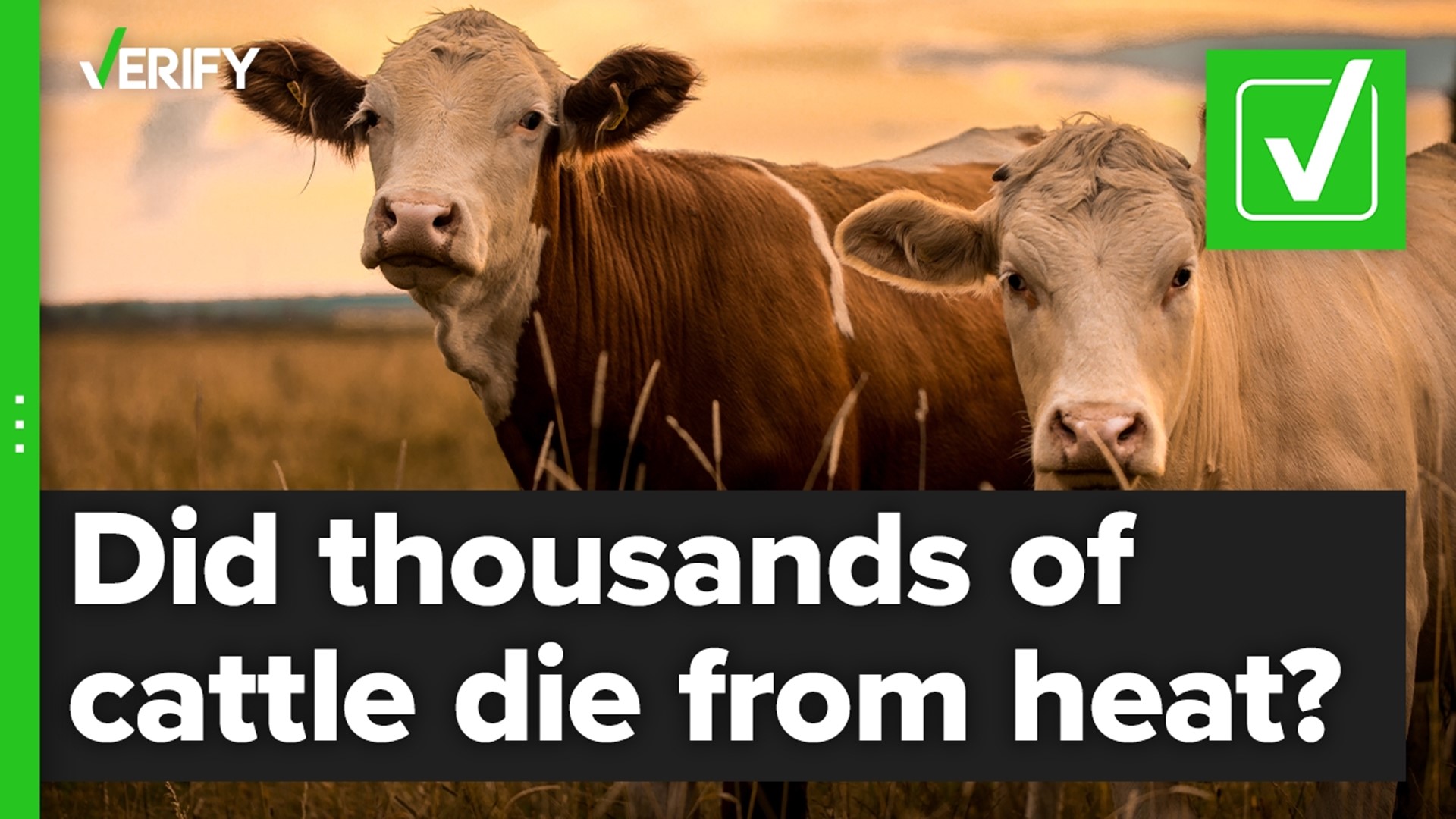A heatwave descended upon the Midwest and South in June, pushing temperatures into the 90s and triple digits in some areas.
The Associated Press reports that the dangerously high temperatures may have led to the deaths of two people in Wisconsin. Now, an unconfirmed video circulating on social media claims to show thousands of cattle dead in Kansas.
Some people on Twitter have questioned whether the extreme temperatures led to the cattle's deaths. One user who shared the video of the cattle claimed in a viral tweet on Tuesday, June 14 that a farmer told them heat was not to blame.
THE QUESTION
Did heat lead to the deaths of thousands of cattle in Kansas?
THE SOURCES
THE ANSWER
Yes, heat led to the deaths of at least 2,000 cattle in Kansas.
WHAT WE FOUND
Matt Lara, a spokesperson for the Kansas Department of Health and Environment (KDHE), said the agency is “aware of at least 2,000 cattle deaths” in southwest Kansas. That number is based on information from facilities that have contacted the agency for help with disposing of carcasses, he added.
The combination of temperatures spiking in a short amount of time, high humidity and low wind, a rare weather event in Kansas, caused the cattle to die due to heat stress, the state Department of Agriculture said in a press release. Jason Walker, a spokesperson for the department, also told VERIFY that the cattle had not yet shed their winter coats when the hot temperatures arrived.
The department doesn’t require ranchers or facilities to report losses, so it doesn’t have data about the total number of cattle that died. Walker said the agency has been in contact with the beef industry and experts at Kansas State University to help provide producers in the area with information and help as needed.
Temperatures increased by 10 to 14 degrees from Friday to Saturday with little wind, high humidity, and lows only falling to about 70 degrees overnight, Walker said. Dodge City, located in southwest Kansas, reached 100 degrees for the sixth time in 2022 on Thursday, June 16, the National Weather Service (NWS) office in the area reported. The city typically sees an average of two 100-degree days by the end of June.
Data from Kansas State University also show that the stress level for animals was “severe” or “extreme” in areas throughout southwest Kansas over the weekend due to the heat.
According to the University of Minnesota, dairy cows begin to feel heat stress at much lower temperatures than humans. In general, mild heat stress starts for cows around 72 degrees with 50% humidity. High-producing cows, which eat more and generate more heat, can also begin to experience heat stress in well-ventilated barns at temperatures as low as 65 degrees.
Heat-related deaths in cattle feed yards are typically rare "because producers take precautions such as providing extra drinking water, altering feeding schedules so cattle are not digesting in the heat of the day, and avoiding moving cattle during the heat of the day," the Kansas Department of Agriculture said.
Lara said KDHE has seen the video of dead cattle that is circulating on social media, but is unable to confirm that it was shot in Kansas. The Department of Agriculture is also aware of the video, but does not know where or when it was taken, according to Walker.
The deaths represent a substantial loss for some Kansas ranchers, as beef cattle is the “single largest sector” in the state’s agriculture industry. Kansas also has the third largest number of cattle on ranches and feedyards in the nation, according to information shared during a 2021 agriculture summit in the state.
But the losses will not lead to beef supply chain issues, according to Kansas Secretary of Agriculture Mike Beam.
“Last weekend’s losses reflect a very small percentage of the total fed cattle numbers in the state, so it will not impact meat prices for consumers,” Beam said. “Regardless, this rare event will hit the feeders who owned the cattle quite hard.

